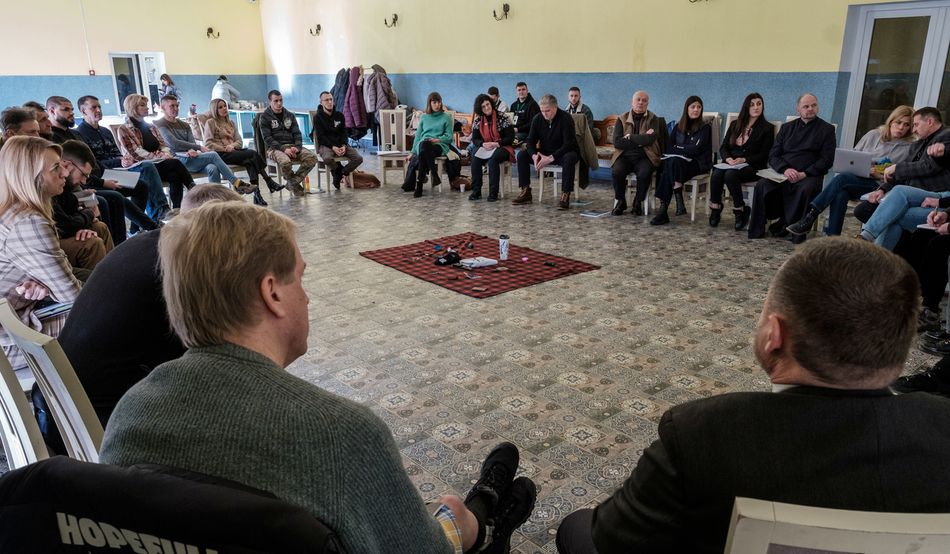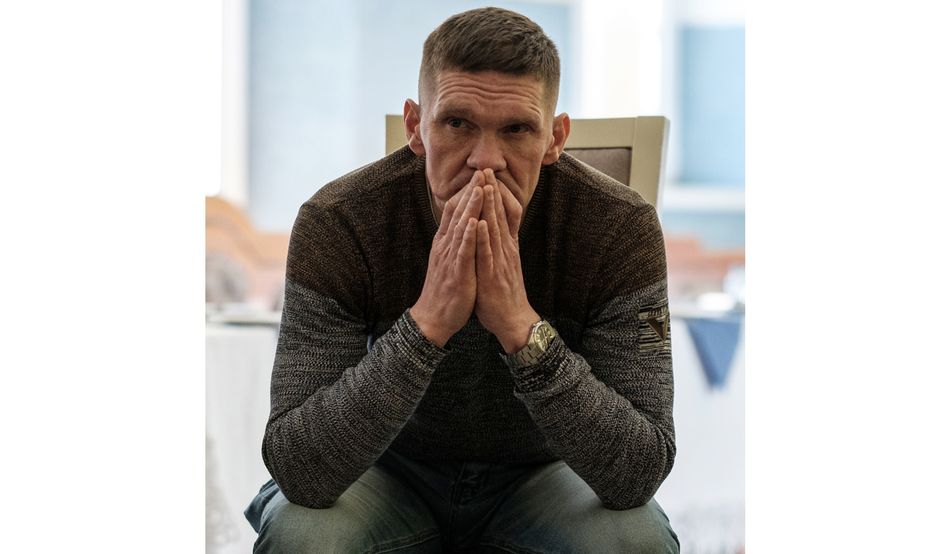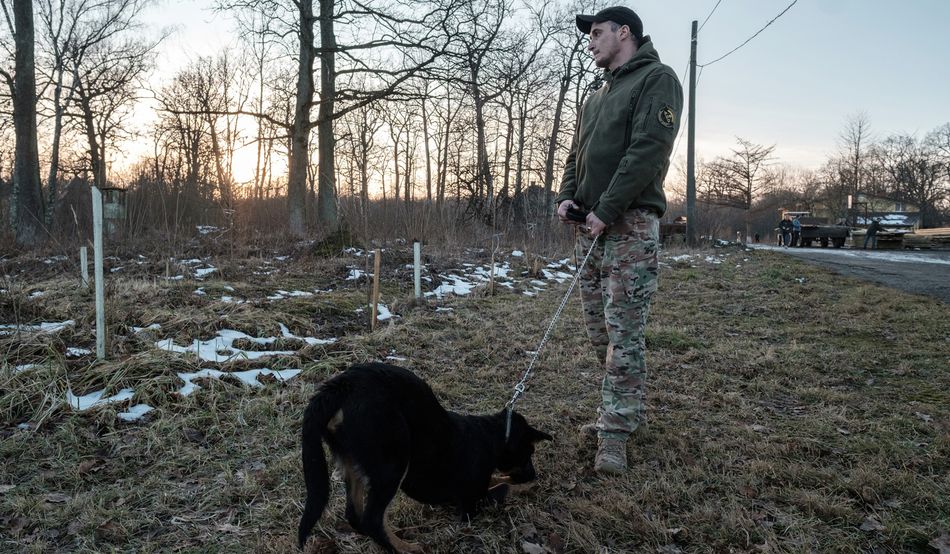When he first joined the Ukraine army in 2015, Taras Danilyuk was armed only with a hunting rifle and a shared machine gun. His first battle, in the Donbas, lasted for five days and he saw death at first hand, with many of his comrades killed or wounded alongside him. As the war dragged on, he witnessed terrible things, as all fighting soldiers do: the deadly aftermath of drone strikes and artillery shells, conditions in the trenches he prefers not to talk about.
But the real trouble kicked in when Danilyuk, 33, came back to civilian life. “When I was at the war, we used to post pictures on social media, and lots of people would comment ‘Oh my god, we’re so proud of you. We love you. You are the best,’” he recalls. “But when I came back, I saw fear of me in their eyes, and a lot of them wouldn’t even say ‘hi’, for whatever reason. And I just had no trust in anyone. It was a very dark time for me.”
Danilyuk escaped into the woods with his dog, Crow, and refused to talk to anyone. He began drinking and taking drugs. There seemed no way back.
This is the hidden aspect of Ukraine’s war—what some are calling “a war within a war”—as the country deals with its returning veterans. More than 300,000 are now back from the front, some of them amputees, many blinded or recovering from wounds so serious they may never work again. The outcome is an epidemic of post-traumatic stress disorder (PTSD), a mental state only half-understood, and which may not even become apparent until years after the event.
“I have seen veterans of the Falklands War who are only now beginning to show symptoms of stress 30 years on,” says Simon Edwards, who served for 16 years with the British army and has worked since then with veterans of wars in Iraq, Afghanistan and Africa, studying the effects not only of PTSD, but also the concept of moral injury—the deep-seated guilt, shame and anger many soldiers feel, both from what they have witnessed or done, but also their own survival, when so many of their comrades have not made it back.
Over that time Edwards has developed a ground-breaking system which aims to reach the source of battle trauma and start the healing process by bringing veterans together to tell their stories. Based loosely on the Alcoholics Anonymous formula, with sufferers seated together in a circle and sharing their experiences, it is perhaps the most sophisticated approach yet trialled for identifying and treating the mental wounds returning soldiers bring with them from the front.
He calls it HopeFull Future, after the Scottish charity with which he is working, and, just as the war with Russia has become a laboratory for new forms of warfare, so this intensive course is pioneering innovative ways of dealing with PTSD in all its forms.
Last month a cross-party group of MPs travelled to Ukraine to see it in action and to study its potential for soldiers in Britain. Among them was the former Tory leader Iain Duncan Smith, who remembers seeing a Ukrainian soldier so traumatised, he drew his pistol and threatened to take his own life.
Each soldier was encouraged to talk about things impossible to discuss with civilians, but heard with understanding and sympathy by fellow soldiers
“The scale of the problem in Ukraine is enormous,” says Duncan Smith, “but this programme, given the right support, can rescue these troubled souls from the never-ending torment of their personal war. “The lessons being learned in Ukraine will be every bit as important for our forces as they are for theirs.”
We met in the unlikely surroundings of a former Soviet nuclear base at Drohobych, south of Lviv, where Edwards and his Ukraine counterparts took their seats alongside some 20 veterans, in chairs arranged in a perfectly formed circle. Thus began a five-day programme, in which each soldier was encouraged to talk about life and death on the front, and what followed at home—things impossible to discuss with civilians, but heard with understanding and sympathy by fellow soldiers. Among them were also some wives and girlfriends, because they too bore the burden of suffering.
“The concept of bringing fellow-veterans together was developed during World War Two,” says Edwards. “As soldiers, we understand that a group is more important than its individual parts. Those who have fought understand this power of human connection that allows us to achieve things beyond our imagination. We call it brotherhood; some might call it love.”
The process has come a long way since the stress of battle was first identified as shell shock in the First World War, and soldiers, including the poets Wilfred Owen and Siegfried Sassoon, were treated in the Craiglockhart hospital in Edinburgh by the psychiatrist Dr William Rivers. His job was to get them back to the trenches as soon as possible. Sassoon nicknamed the place “Dottyville”.
In the Second World War, more extreme methods were advocated by the celebrated psychiatrist William Sargant, who advocated such things as shock therapy and psychosurgery.
Edwards is working with Olena Zvereva, a clinical psychologist from Ukraine, who at the outset of the war first set up the centre, called, appropriately enough, Nazareth. Both encouraged the veterans to lose their reserve and talk freely among themselves. Gradually their stories began pouring out. They made for difficult listening.
Mykola Vashynin, 33, who joined up in the early months of the war, remembered how, to begin with, the adrenaline had kicked in and he found the action thrilling. He took his dog Runa with him, and fought near Luhansk when the Russians first seized territory in eastern Ukraine, facing occasional artillery fire but feeling invulnerable.
“I was always next to our commander, who was a super positive person, in good spirits all the time,” he says. “So I kind of took it from him, and a lot of guys were very motivated in our group—lots of adrenaline, lots of high spirits.”
That all collapsed when his childhood friend Oleksander was killed by a sniper’s bullet. Vashynin fell out with his commander, got into trouble, and finally, after refusing to obey orders, was forced to leave behind the comrades with whom he had bonded.
“Losing people you love is not the worst,” he says. “The worst is seeing how civilians ignore you. There’s zero reaction to the fact that my friends were dying out there, and that was very difficult for me.”
Vashynin began drinking heavily, was abandoned by family and friends, and became aggressive towards strangers in the street. Finally, he was reported to the authorities, not because he might be a threat to others, but because onlookers thought his dog was in danger.
Rescuing people like Danilyuk and Vashynin, and hundreds of others across Ukraine, is the ambition of Edwards’ project. He has teamed up with Zvereva, whose assistants scour the streets for those who cannot cope with civilian life, and bring them to the sanctuary of Nazareth.
She said the meeting with Edwards, who first came to Ukraine in 2023, “felt like magic” because they were both talking the same language about how best to rebuild the strength and character of individuals who may have lost both.
“Nothing is going to stop an idea whose time has come,” she proclaims. “When I started talking to Simon about our methods, I realised we were doing the same here as he had been doing in Britain. We now need to scale this up across the whole of Ukraine.”
Edwards describes their joint project as “a meeting of minds.” He had been looking for a local group to work with, and “there was Olena, ready and waiting”. Between them, they are developing a programme of recovery which relies on two things: the shared experiences of the veterans themselves, and a search for the true self each may be concealing from the outside world.
Edwards quotes an old Norse saying: “You have a path and a purpose. Regardless of what anyone says, it’s time to find it.” This, he says, comes close to a spiritual journey.
“A bit over the top?” I ask. He admits that perhaps it is. “I’m still trying to find the right language to describe this, but what all the veterans agree on is that the brotherhood, the camaraderie they form in battle is what binds them together, and I do unashamedly use the word ‘love’.
“In battle, in combat, when your life is threatened, when, every second you are trying to kill other people and stop them killing you, or, more importantly, killing the man alongside you, then that concept of laying down your life for your fellow man becomes absolutely the heart of what these guys feel.”
They explore the guilt of the young private who was five minutes late joining his company one morning, so missed the rocket attack that killed 20 of his comrades
Back in civilian life, he points out, that bond disappears, and the returning soldier finds himself dealing with a society that has very little real understanding of what he has gone through.
“Suddenly, you are no longer in the gang,” he adds. “You’re on your own to deal with your injuries. And for most people that’s the reality of the veteran.”
Listening to the soldiers pour out their stories—some telling them for the first time—the sense of a healing process becomes clear. Over five days they explore a range of emotions—the guilt of the young private who was five minutes late joining his company one morning, so missed the rocket attack that killed 20 of his comrades; the soldier, so badly injured he could no longer fight, but who found life with his family so hard to adjust to that his only ambition was to return to the front; the woman whose boyfriend is fighting near Pokrovsk, a town the Russians have been trying to take for more than a year and who knows he will never return— “not because he may be killed, but because he cannot abandon his comrades,” she explains; the medic on the front line who failed to save a soldier’s life because he did not have enough equipment.
“At the beginning I had a lot of faith and motivation,” says one soldier. “I wanted to fight for our victory, wanted to serve my country. But as time went on, I started having doubts, losing faith, witnessing the unfairness, betrayal of the commanding officers. I didn’t want to leave but couldn’t stomach it either. I fell into despair. I just wanted to be killed, often praying that the next shell fired at us would take me. At the end it was darkness—I was just following orders, doing what I’m told. I wasn’t trying to protect my life, wasn’t afraid of the death. In Bakhmut I stopped wearing body armour, I just didn’t care anymore.
Another added: “I had the same thing… bullets, shell, incoming fire—you just don’t care. When you join the army, at first you feel motivated and mobilised, but then as time passes, you don’t get any breaks, and you just lose it. You sleep yet you don’t feel rested. My biggest moment of darkness was when Russians took over our positions, and our infantry were there. My commanders said none of our guys survived. They ordered us to go and level that position with all the Russians that took it. So, we did—we went and destroyed everything with the tank fire. And later I saw on the drone video, that actually our guys were wounded but still alive. So, we killed and buried them along with the enemy. I don’t know, maybe we couldn’t have saved them, we will never know. But we killed our own wounded mates.”
Edwards and his team listen to stories like this, and then begin a dialogue. In each case, the group’s aim is to persuade the veteran involved to let go of the past, to find the inner strength they had lost, and to build hope for their future. “We call it post traumatic growth,” explained Edwards, “the realisation that life’s greatest gift is the ability that lies within us to change ourselves—that failure is ultimately the route to success.”
The urgent aim now is to train more trainers—ideally the veterans themselves. The team has now been in Nazareth twice, before moving to Kalush, a grim ex-Soviet town two hours east of Drohobych, made famous by the Kalush Orchestra who won the Eurovision Song Concert in 2022. Up to 14 people were trained in facilitation skills over a two-day session at Nazareth, followed by a three-day veteran peer led programme in Kalush.
“The programme has gone well,” said Edwards. “We’ve had a great response. We have great support at the political level and we have funding for at least a year. This is allowing us to take a two-prong approach, working through the national Catholic charity, Caritas, to develop facilitators and direct through veteran centres in towns and cities across Ukraine.
“In time we plan to adapt the model so that we can address the needs of female veterans, wives, widows, parents and maybe children who have lost parents. Our next programmes will take place in early May in Kalush again to embed the programme there and Lviv.”
For Taras Danilyuk and Mykola Vashynin, who have followed that route, and now take part in Olena’s programme at the Nazareth centre, working with other veterans is itself part of the healing process.
“What really works for me,” said Vashynin, “is that every person is different. When we’re all together, I can see how someone’s reacting to an idea, someone’s opening up, someone’s closing down. Because we have been through so many different things, we react in different ways, and one idea or another will resonate with each of us. But just seeing each other doing this, helps.”
Then he said something surprising. Maybe, he suggested, I should take this lesson back to the UK, because trauma is not just a factor in war, it is something all societies have to deal with—at different levels, possibly, but suffering nevertheless.
“When you go back, tell all the world what’s going on here,” he said. “This is not just our war, it’s yours too. Hopefully we will learn something from it. But perhaps you will learn from us as well.”
HopeFull Future is a programme supported by the Scottish charity HopeFull, which has been delivering food across Ukraine since the outset of the war. Over that time it has handed out more than 2.5m pizzas to 1800 towns and villages.















